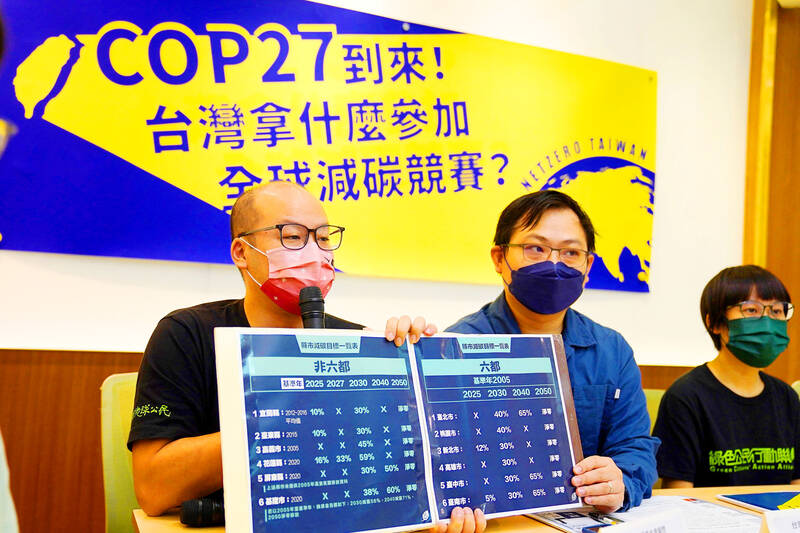Climate groups yesterday urged the government to increase planned carbon emissions cuts from 20 percent to 40 percent by 2030, a day after UN Secretary-General Antonio Guterres told the COP27 summit in Egypt that the world is on the “highway to climate hell.”
After targeting a 2 percent carbon emissions cut by 2020, Taiwan’s climate aims include achieving a 20 percent cut by 2030 and a 50 percent cut by 2050, Citizen of the Earth, Taiwan adviser Tsai Chung-yueh (蔡中岳) told a news conference in Taipei.
The administration of President Tsai Ing-wen (蔡英文) is pushing amendments to Taiwan’s climate laws that would include a carbon fee scheme and renaming legislation as a “climate change response act,” officials have said.

Photo: CNA
These goals were stipulated in the 2014 Greenhouse Gas Reduction and Management Act (溫室氣體減量及管理法), which predated the policy aim of reaching net zero emissions by 2050, Tsai Chung-yueh said.
Other countries have realized that the 2050 net zero goal is not possible without elevating emission reduction targets for 2030, he said, adding that continued inaction would put Taiwan’s commitment to carbon neutrality in a bad light.
Cutting carbon emissions by only 20 percent by 2030 would mean that annual reductions from then to 2050 would need to be 33 percent greater than with a 40 percent reduction by 2030, or an additional 10.73 million tonnes of carbon annually, Taiwan Environment and Planning president Chao Chia-wei (趙家緯) said.
The government’s plan to increase the share of renewable sources of energy in electricity generation and promote electric vehicles is sufficient to accommodate the 40 percent goal, Chao said.
The legislature must pass the climate change bill this legislative session to help prevent further delays in the implementation of net zero emissions, Green Citizens’ Action Alliance researcher Chin Shu-huai (秦書淮) said.
Every year of delay in implementation means 60 billion tonnes of carbon emissions go uncharged, which results in taxpayers subsidizing polluters without getting anything in return, Chin said.
The bill should be redesigned to emphasize carbon fee collection from corporations over subsidy payouts for reduced emissions to avoid taking the bite out of the fees, she said.
Use of carbon revenue should focus on aid to groups that are most affected by climate-related disasters and establish a timetable for transforming the carbon fee system to the carbon tax system, she said.
Taiwan’s six special municipalities, which are responsible for 70 percent of the nation’s carbon output, have established policies to accomplish emissions cuts of more than 30 percent by 2030, Environmental Rights Foundation researcher Lin yen-ting (林彥廷) said.
The national government should not be outdone by local governments in protecting the environment and it should urgently amend the climate change bill with the changes the groups have asked for, Lin said.
See stories on pages 5 and 6

Chinese Nationalist Party (KMT) Chairman Eric Chu (朱立倫), spokeswoman Yang Chih-yu (楊智伃) and Legislator Hsieh Lung-chieh (謝龍介) would be summoned by police for questioning for leading an illegal assembly on Thursday evening last week, Minister of the Interior Liu Shyh-fang (劉世芳) said today. The three KMT officials led an assembly outside the Taipei City Prosecutors’ Office, a restricted area where public assembly is not allowed, protesting the questioning of several KMT staff and searches of KMT headquarters and offices in a recall petition forgery case. Chu, Yang and Hsieh are all suspected of contravening the Assembly and Parade Act (集會遊行法) by holding

PRAISE: Japanese visitor Takashi Kubota said the Taiwanese temple architecture images showcased in the AI Art Gallery were the most impressive displays he saw Taiwan does not have an official pavilion at the World Expo in Osaka, Japan, because of its diplomatic predicament, but the government-backed Tech World pavilion is drawing interest with its unique recreations of works by Taiwanese artists. The pavilion features an artificial intelligence (AI)-based art gallery showcasing works of famous Taiwanese artists from the Japanese colonial period using innovative technologies. Among its main simulated displays are Eastern gouache paintings by Chen Chin (陳進), Lin Yu-shan (林玉山) and Kuo Hsueh-hu (郭雪湖), who were the three young Taiwanese painters selected for the East Asian Painting exhibition in 1927. Gouache is a water-based

Taiwan would welcome the return of Honduras as a diplomatic ally if its next president decides to make such a move, Minister of Foreign Affairs Lin Chia-lung (林佳龍) said yesterday. “Of course, we would welcome Honduras if they want to restore diplomatic ties with Taiwan after their elections,” Lin said at a meeting of the legislature’s Foreign Affairs and National Defense Committee, when asked to comment on statements made by two of the three Honduran presidential candidates during the presidential campaign in the Central American country. Taiwan is paying close attention to the region as a whole in the wake of a

OFF-TARGET: More than 30,000 participants were expected to take part in the Games next month, but only 6,550 foreign and 19,400 Taiwanese athletes have registered Taipei city councilors yesterday blasted the organizers of next month’s World Masters Games over sudden timetable and venue changes, which they said have caused thousands of participants to back out of the international sporting event, among other organizational issues. They also cited visa delays and political interference by China as reasons many foreign athletes are requesting refunds for the event, to be held from May 17 to 30. Jointly organized by the Taipei and New Taipei City governments, the games have been rocked by numerous controversies since preparations began in 2020. Taipei City Councilor Lin Yen-feng (林延鳳) said yesterday that new measures by